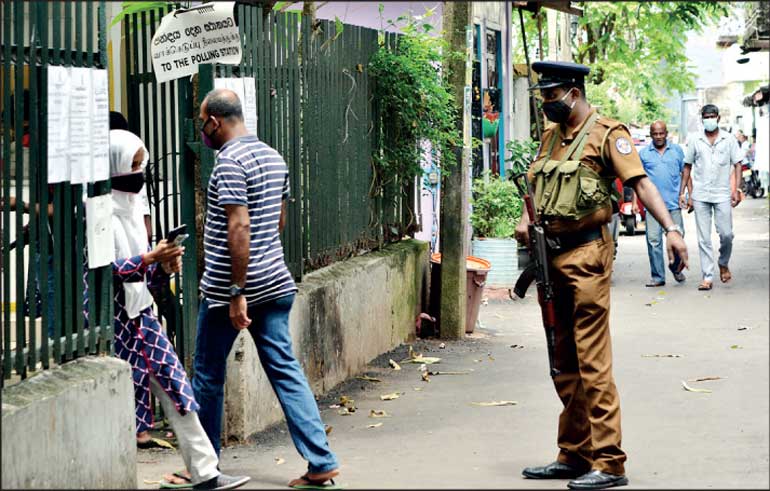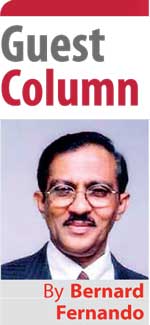Monday Feb 16, 2026
Monday Feb 16, 2026
Saturday, 26 February 2022 00:00 - - {{hitsCtrl.values.hits}}

 I allude to the recent press report that the local government elections are to be held again under the Mixed Member Voting (MMV) system.
I allude to the recent press report that the local government elections are to be held again under the Mixed Member Voting (MMV) system.
At the outset, it needs to be emphasised that the MMV system that was tested with the last Local Government Elections (2018) was confronted with enormous ‘overhang’ problems, delays and complexities leading to a ‘hang-over’ among election officials forcing a dramatic and wasteful increase (nearly threefold) in the total number of local Government members. It is clear that the MMV system is a complicated imported system applied to appease the proponents of the traditional Westminster styled ‘First-Past-the Post’ system at the expense of the more scientific ‘Proportionate Representation (PR) system.
The moot point here is, what is so sacred about the 60: 40 mix in the FPP and PR systems as a mechanism to name party-wise candidates to represent identified geographical units? As no scientific basis has been adduced, one can always argue for a 55:45 or 65:35 mix. Therefore, it is ad hoc and debatable. Moreover, the 25% women’s participation could not be ensured adding to the failure of the MMV system as a whole.
The sad and unfortunate irony is that despite 74 years of failure of our electoral systems, to guarantee achievement of the primary and most fundamental objectives of any electoral system viz. equality of vote and the quality of the voter representatives; the powers that be plus the authorities and the voter dedicated organisations are busy with secondary issues such as imposing limits for ‘campaign financing’, ensuring immediate voting rights for youth completing 18 years of age, establishing ‘pre-polling booths’ for voters in essential services and for those living overseas coupled with a host of other minor issues.
In the meanwhile, already registered voters exceeding 16.3 million are languishing in the wings for a simple, rational, transparent and a low-cost electoral process/mechanism that they can freely understand before exercising their franchise. Although in this instance, the writer as a concerned senior citizen (having exercised his voting right for the last 57 years), advocates a ‘de-politicised’ local government machinery, the apparent urgency on the part of the Government irked his conscience to pen a simple alternative proposal for holding the proposed Local Government Elections as given below.
A simple alternative for ‘Mixed Member Voting’ (MMV) system
In the aforesaid backdrop, the following objective steps are proposed in lieu of the high cost, complex and laborious MMV system which is ‘rocket science’ to our simple voters!
Towards primary objective of accurately determining the number of seats won by each party
1) Identify Divisional Secretariat Divisions (DSDs) as the main polling divisions and allocate a specific number of seats to each such Division based on the existing Delimitation Report which obviously has considered statistical data on demographic, geographic, ethnic and socio-economic variables.
2) Apply simple proportionate arithmetic to the sum total of valid votes of seat winning parties in each DSD and determine the number of seats won by them.
Towards secondary objective of ensuring quality members to fill the seats won by each party
1) Devolve total responsibility to the contesting parties as corporate bodies to fill their allotted seats with selected team members/candidates as per a list mentioned under item 3 below.
2) However, when selecting their prospective candidates, the contesting parties as corporate bodies governed by constitutions, should at the outset, be required to abide by a mandatory set of eligibility and selection criteria and a structured interview mechanism laid down by the Elections Authority. Also, placement of women candidates high in the merit list to ensure 25% participation shall be made mandatory for all contesting parties.
This process has become compulsory owing to the main parties outrageously continuing to field ineligible candidates with notorious/corruption records and backgrounds leaving a ‘Hobson’s choice’ to hapless voters to elect mythical ‘horses’ from lists of proverbial ‘donkeys’! Also, with the enforcement of the said mandatory criteria, the voters will surely discard the hackneyed belief that the party leaders can unilaterally include their henchmen in the candidate lists.
3) The preliminary merit lists should be published in the press by the authorities in advance to allow for objections and/or approval by the public. Ineligible candidates can further be delisted by the returning officers at nomination time and through election petition after the election. To meet such eventualities, the parties should include extra names also in merit order.
Accordingly, the Elections Authority can relax its focus on the procedure for naming quality candidates by simply insisting on the parties to register certified final lists of candidates in merit order together with requisite affidavits under each DSD that they are contesting.
4) The 4-year Party Policy/Action Program should be upgraded to the level of a ‘Prosecutable Document’ to prevent the incidence of false and utopian promises. The advent of such a legalized Policy/Action Program will enable the voter to decide on his sole ‘X’ mark against his chosen Party with more confidence.
5) To strictly abide by the Policy/Action Program and deliver results, the respective Party hierarchies will have to take ownership of the candidates/team members they are fielding. Accordingly, the entire election campaign should be handled by the party head office. As a result, ‘campaign financing’ can be better ascertained and monitored by the authorities.
Other advantages of the proposed method
1) The voter is simply required to mark only one ‘X’ against the selected party symbol on the ballot paper, based primarily on the 4-year policy/action program and secondarily on the ‘goodwill’ of such party and the quality of the given candidate list.
2) As a result of 1 above, the numbers of rejected votes are bound to get reduced considerably.
3) The expenditure, time and energy spent by the Elections Department will drastically come down and the final election result can be announced by midnight.
4) Less affluent but more deserving candidates will not be required to finance their own campaign even within the limited area of a DSD.
5) Ensures advent of a wise and genuine set of ‘development facilitators’ with a high degree of ‘common sense’ who are best positioned to discharge the objectives and functions of a DSD with priority given to the respective policy/action program of the winning party.
Conclusion
In order to realise the foregoing, the writer is confident that Sri Lanka’s ‘sovereign voter dedicated’ organisations like ‘PAFFREL’, ‘CAFFE’ and ‘CMEV’ will take this final opportunity and convince the National Elections Commission and the relevant authorities to ensure equality of vote and quality of voter representatives at all levels and prevent holding costly and irrational elections under the pretext of championing democracy and voter franchise.
The writer is also confident that the MPS as legislators and the President as the Executive Chief of the country who values simple mechanisms and ‘out of the box’ system changes, will in their wisdom ensure the passage of the above proposals and the necessary laws towards a truly democratic and a peaceful Sri Lanka.
(The writer is a retired banker and could be reached via email at [email protected].)